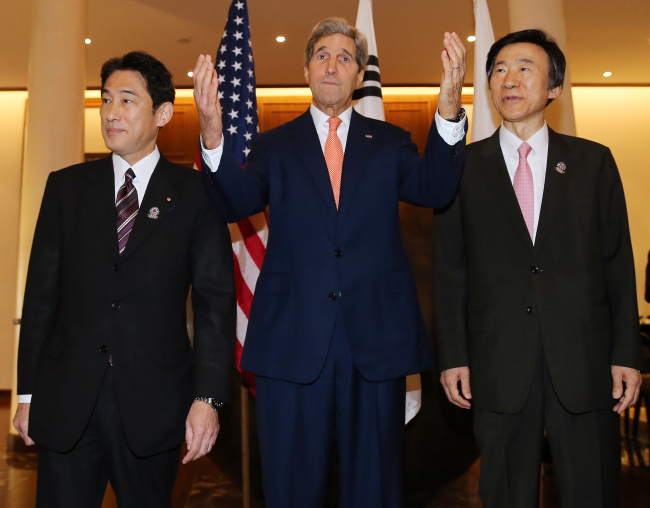Yun presses Japan on history
Korea, U.S., Japan stress coordination against N.K. threats
By Korea HeraldPublished : Aug. 10, 2014 - 20:42
NAYPYITAW ― Foreign minister Yun Byung-se urged Japan on Saturday to resolve simmering diplomatic tension by ceasing denials of its wartime atrocities, including its use of tens of thousands of Korean and other Asian women as sex slaves for its World War II soldiers.
Yun made the statement before meeting with his Japanese counterpart, Fumio Kishida, on the sidelines of the annual security forum hosted by the Association of Southeast Asian Nations, dubbed the ASEAN Regional Forum.
The last official meeting between the two foreign ministers was in September last year in New York.
Yun said that Seoul-Tokyo relations have been frayed because of Japan’s incessant attempt to rewrite history, including its recent review of the “Kono statement, a landmark 1993 apology for its wartime sexual slavery.
“Over the past year, bad news outweighed good news with regard to Seoul-Tokyo relations,” Yun told reporters before holding the meeting. “If Japan shows sincerity toward the issue of shared history, the two countries’ chilly ties will improve. Wisdom is needed to move out of a dark tunnel.”
Also fueling tension between the two countries is Japan’s territorial claims to Seoul’s easternmost islands of Dokdo, along with its decision to exercise the right to collective self-defense.
Yun made the statement before meeting with his Japanese counterpart, Fumio Kishida, on the sidelines of the annual security forum hosted by the Association of Southeast Asian Nations, dubbed the ASEAN Regional Forum.
The last official meeting between the two foreign ministers was in September last year in New York.
Yun said that Seoul-Tokyo relations have been frayed because of Japan’s incessant attempt to rewrite history, including its recent review of the “Kono statement, a landmark 1993 apology for its wartime sexual slavery.
“Over the past year, bad news outweighed good news with regard to Seoul-Tokyo relations,” Yun told reporters before holding the meeting. “If Japan shows sincerity toward the issue of shared history, the two countries’ chilly ties will improve. Wisdom is needed to move out of a dark tunnel.”
Also fueling tension between the two countries is Japan’s territorial claims to Seoul’s easternmost islands of Dokdo, along with its decision to exercise the right to collective self-defense.

Seoul and Tokyo have held director general-level talks over the issue of sex slaves, commonly called “comfort women” since April, but Japan’s review of its 1993 apology over the sexual slavery led to the suspension of the talks in June before they were resumed last month.
Yun stressed that resolution of the comfort women issue was key to improving Seoul-Tokyo relations, according to an official at Seoul’s Foreign Ministry.
“The Korean government hopes that Japan will take tangible measures to resolve the issue as soon as possible,” Yun was quoted by the official as telling his Japanese counterpart.
In response, Kishida said that there was no change in Japan’s stance that it will uphold the spirit of the Kono Statement, adding that the two nations need to make efforts to continue to hold talks on the sex slavery issue, according to the official.
Koichi Mizushima, deputy press secretary at the Japanese Ministry of Foreign Affairs, said that the two nations had discussed “the future direction of the Japan and Korea relationship.”
“They agreed on the importance to continue and deepen communication,” he told AFP, adding that future talks would be at various levels, including the foreign ministers.
“Although there are some difficult issues between the two countries, the good relationship between Japan and Korea is for the mutual benefit not only for both countries but also good for the peace and stability of the Asia Pacific region,” he said.
On Sunday, the top diplomats from South Korea, the United States and Japan agreed to beef up their coordinated approach against threats from North Korea’s nuclear weapons program and missile launches, Seoul officials said.
“The three countries shared the need to strengthen coordination against North Korea’s missile threats, necessitating a more systemic response to those risks,” said a Seoul Foreign Ministry official after the meeting among Yun, Kishida and U.S. Secretary of State John Kerry.
“The situation in the Korean Peninsula is very uncertain and unstable because of growing threats from North Korea,” Yun said ahead of the start of the talks.
“So this is the right time for us to make our joint strategy on how to deal with these growing (threats). ... Now we have to consolidate our joint strategy.”
(From news reports)
-
Articles by Korea Herald





![[Graphic News] Number of coffee franchises in S. Korea rises 13%](http://res.heraldm.com/phpwas/restmb_idxmake.php?idx=644&simg=/content/image/2024/05/02/20240502050817_0.gif&u=)


![[Robert J. Fouser] AI changes rationale for learning languages](http://res.heraldm.com/phpwas/restmb_idxmake.php?idx=644&simg=/content/image/2024/05/02/20240502050811_0.jpg&u=)









![[Eye Interview] 'If you live to 100, you might as well be happy,' says 88-year-old bestselling essayist](http://res.heraldm.com/phpwas/restmb_idxmake.php?idx=652&simg=/content/image/2024/05/03/20240503050674_0.jpg&u=)
